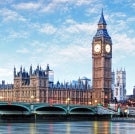New technology will allow the UK to receive earlier warnings of floods and droughts, the Government has said.
As part of a scheme to improve the Government’s response to extreme weather, a UK-wide network is to be established, with a focus on pinpointing where incidents are likely to occur and implementing plans to limit their impact.
The project will aim to “halt damage and cut eye-watering cost to the economy”, the Department for Science, Innovation and Technology said.
There is no time to waste in backing our researchers and innovators to ensure we are better prepared for floods and droughts striking
Data will be gathered by sensors in rivers across the UK to identify potential flashpoints, which the Government hopes will save lives, and reduce damage to homes and businesses.
Technology Secretary Peter Kyle said: “Flooding and droughts can devastate UK communities, from leaving people stranded, to destroying homes, gardens, roads and businesses, and even claiming lives.
“With climate change sadly making extreme weather events more common and adding an eye-watering cost to the economy, there is no time to waste in backing our researchers and innovators to ensure we are better prepared for floods and droughts striking.
“This project will help drive that progress, with dedicated teams using the most advanced tech to crunch data gathered from our rivers and paint a clear picture of its likely impact – using the power of science and tech to keep the public safe.”
The Floods and Droughts Research Infrastructure project will receive £40 million in funding, and will be led by the Natural Environment Research Council (Nerc) and the UK Centre for Ecology and Hydrology.
Findings from the project will be shared with bodies such as the Environment Agency to steer the UK response to extreme weather, while also acting as a hub for researchers to pursue new innovations with discoveries.
Floods minister Emma Hardy said: “In the case of extreme flooding and drought, preparation and prediction are everything.
“Our new institute will bring together a team of world-leading researchers and the latest technology to ensure our communities, businesses and farms are protected from these devastating events.”
Source: independent.co.uk



